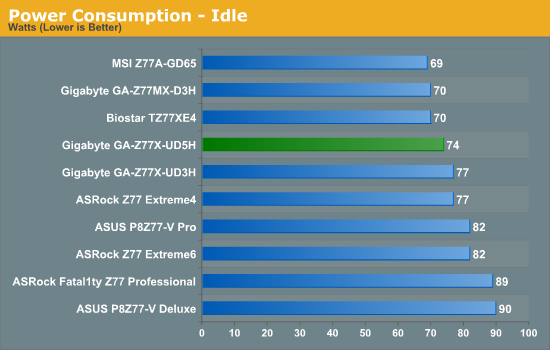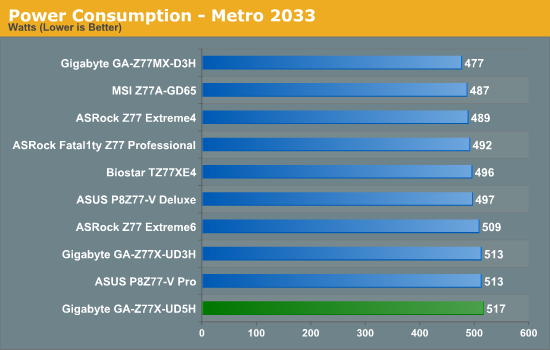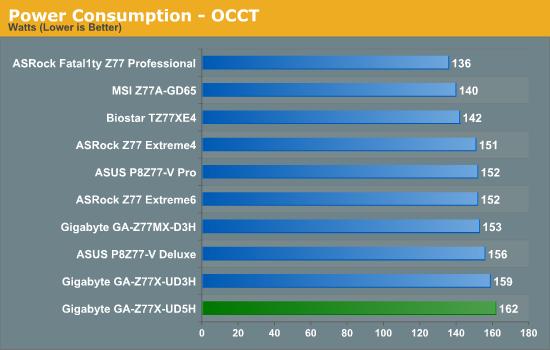Gigabyte GA-Z77X-UD5H Review: Functionality meets Competitive Pricing
by Ian Cutress on July 25, 2012 5:00 AM EST- Posted in
- Motherboards
- Gigabyte
- Z77
Many thanks to...
We must thank the following companies for kindly donating hardware for our test bed:
OCZ for donating the Power Supply and USB testing SSD
Micron for donating our SATA testing SSD
G.Skill for donating our memory kits
ASUS for donating AMD GPUs and some IO Testing kit
ECS for donating NVIDIA GPUs
Test Setup
| Processor |
Intel Core i7-3770K ES 4 Cores, 8 Threads, 3.5 GHz (3.9 GHz Turbo) |
| Motherboards |
ASRock Z77 Extreme4 ASRock Z77 Extreme6 ASRock Fatal1ty Z77 Professional ASUS P8Z77-V Pro ASUS P8Z77-V Deluxe Biostar TZ77XE4 Gigabyte GA-Z77X-UD3H Gigabyte GA-Z77MX-UD3H MSI Z77A-GD65 Gigabyte GA-Z77X-UD5H |
| Cooling | Intel All-in-One Liquid Cooler |
| Power Supply | OCZ 1250W Gold ZX Series |
| Memory |
GSkill RipjawsZ 4x4 GB DDR3-2400 9-11-11 Kit GSkill TridentX 2x4 GB DDR3-2666 11-13-13 Kit |
| Memory Settings | XMP (2400 9-11-11) |
| Video Cards |
ASUS HD7970 3GB ECS GTX 580 1536MB |
| Video Drivers |
Catalyst 12.3 NVIDIA Drivers 296.10 WHQL |
| Hard Drive | Micron RealSSD C300 256GB |
| Optical Drive | LG GH22NS50 |
| Case | Open Test Bed - CoolerMaster Lab V1.0 |
| Operating System | Windows 7 64-bit |
| SATA Testing | Micron RealSSD C300 256GB |
| USB 2/3 Testing | OCZ Vertex 3 240GB with SATA->USB Adaptor |
Power Consumption
Power consumption was tested on the system as a whole with a wall meter connected to the OCZ 1250W power supply, while in a dual 7970 GPU configuration. This power supply is Gold rated, and as I am in the UK on a 230-240 V supply, leads to ~75% efficiency > 50W, and 90%+ efficiency at 250W, which is suitable for both idle and multi-GPU loading. This method of power reading allows us to compare the power management of the UEFI and the board to supply components with power under load, and includes typical PSU losses due to efficiency. These are the real world values that consumers may expect from a typical system (minus the monitor) using this motherboard.



Power consumption for the Z77X-UD5H was low at idle compared to the majority of the motherboards we have tested with, but draws the most power under OCCT and Metro 2033 (though not by much).










70 Comments
View All Comments
IanCutress - Tuesday, July 31, 2012 - link
Please note that even if you have purchased a '6Gbit/s' SSD, it will never run at that speed. If you look at our SATA and USB testing, none of the peak speeds we see in our benchmarking ever reach the peak advertised by the port due to the limitations of the hardware. They more often than not do not even reach the peaks of the hardware due to latency or real-world situations. Most rated speeds are for compressible continuous data with a high queue-depth - not ever a realistic scenario.Testing every 3rd party controller adds testing time. Going from 2-3 boards a month do maybe one and a bit. Especially if they're all connected differently on the board (which we don't always know without specific chipset diagrams for the specific product, which are not always available). After all, peak tests are limited in their understanding anyway - take the new USB boost technologies from ASUS and ASRock. ASUS' implementation affects mainly short size block transfers by several order of magnitudes (as found out in our testing), rather than peak by any significant amount.
I am quite astounded by your insistence that if you have many ports that they must all run at their peak speed in conjunction with each other at the same time. It just doesn't work that way. Have a gander at the chipset diagrams in our first Z77 reviews to understand this. Bandwidth is delivered to what needs it at the right time - the usage model for hammering all the ports at once is almost non-existent.
Ideally we'd love to test everything at the peak, but we do not have an unlimited amount of cash to go and buy equipment. We're independent freelance reviewers making do with what kit we can get together or are offered.
iCrunch - Sunday, July 29, 2012 - link
I've become so spoiled by how incredibly seamlessly, fast, and consistent Thunderbolt works. Add to that the fact that I can probably get most of the specs in an external Thunderbolt enclosure/dock solution fairly soon...albeit for a tad more money.Scootiep7 - Sunday, July 29, 2012 - link
Wow, so Gigabyte finally took my complaints to heart and started releasing boards with something other than that ALC887 miserable excuse for an audio codec. Bravo good sirs, better late than never. Now get it done on more of your boards!Questor - Tuesday, July 31, 2012 - link
I have this motherboard with an Ivy Bridge i5 3570K, currently at a stock speed, with a Plextor 128 GB SATA III SSD as the OS drive. Even with the post logo screen enabled, I get to desktop log-in in about 7 seconds. Excluding the "artificially" added time to type my password, full desktop is an average of 2.5 seconds from there. Not bad considering the programs I have that load versus Anantech testing.I have had my board since its early retail release and this has not changed much; even after replacing the original i5 2500K and Samsung SATA II 128 GB SSD for the above mentioned components.
Questor - Tuesday, July 31, 2012 - link
In addition to the boot time being misleading commentary and the response to the USB vs PS/2 keyboard, my present computer build with this Gigabyte board is one of the best/favorite rigs in my 14 years of building and tweaking computers.The other few are ASUS P8P67-PRO, Gigabyte MA790GP-UD4H (X2 with two cores unlocked to quad and STILL running stable), EPoX EP-9NPA+ Ultra, ASUS P5A with AMD K6-350 (severe electrical spike took it out after years of OCing - jumped the surge protector)!
Questor - Tuesday, July 31, 2012 - link
In addition to the boot time being misleading commentary and the response to the USB vs PS/2 keyboard, my present computer build with this Gigabyte board is one of the best/favorite rigs in my 14 years of building and tweaking computers. The other few are ASUS P8P67-PRO, Gigabyte MA790GP-UD4H (X2 with two cores unlocked to quad and STILL running stable), EPoX EP-9NPA+ Ultra, ASUS P5A with AMD K6-350 (severe electrical spike took it out after years of OCing - jumped the surge protector)!minlian - Sunday, August 12, 2012 - link
Is the reaction time DPC Latency error fixed on the Gigabyte Z77X-UD5H-WB-WiFi version or are they just the same motherboard with just a wifi difference?Triniman - Sunday, August 12, 2012 - link
Ian Cutress wrote, "...a total of 10 USB 3.0 ports available (if you have enough USB 3.0 panels)."Does anyone know of any cases that will would allow you to use the 3 onboard USB 3.0 headers?
Also, is it correct that the Gigabyte doesn't include drivers for these VIA controllers?
ETruett - Tuesday, September 11, 2012 - link
Hay. I am wondering if the Gigabyte GA-Z77X-UD5H Motherboard will fit in the Dell E510 Case? Or which Case can i get? I would like to build a nice gaming pc that whill not break me. I dont have much money. My eMail is: etruett9@gmail.com..... :-))gkatsanos - Monday, November 26, 2012 - link
Hi, It's weird how in any of the reviews there was a word for the problems (bugs) this M/B has. I ordered it a week ago and even if I upgraded my BIOS to the latest version, it still suffers from problems.. I had for example to disable the Marvell sata controller and connect my drive to the intel chipset one for the system to shutdown properly... Other folks have had freezes etc. Google the model + problems and you'll see. I am thinking of changing it with an Intel m/b or something more stable..